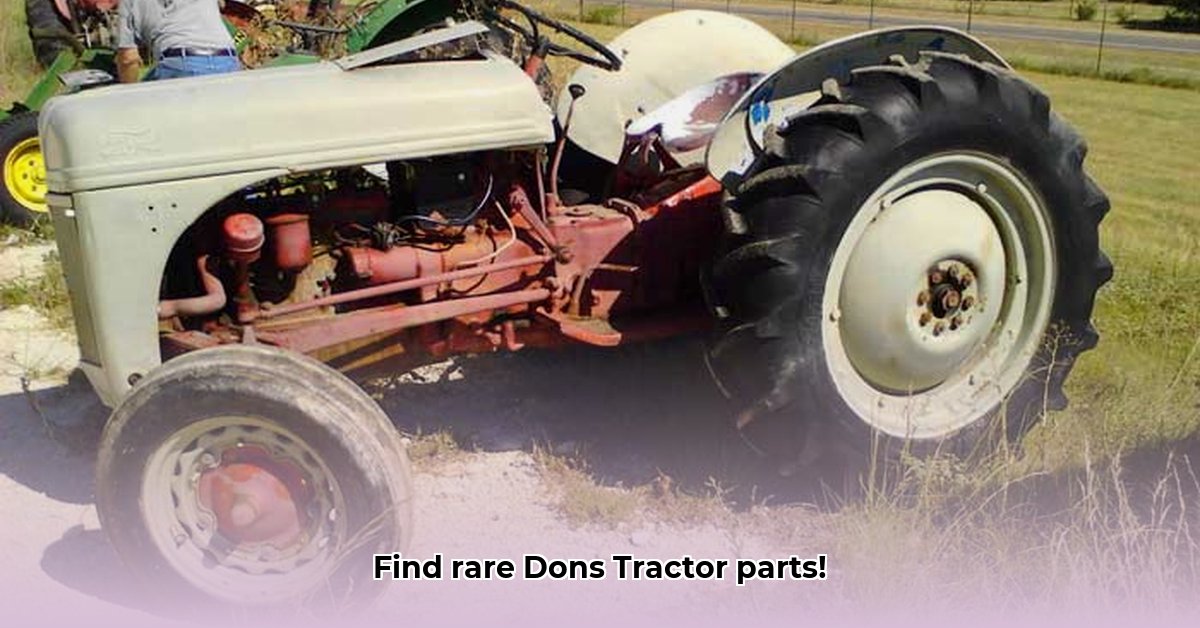
Unearthing Agricultural History: The Story of Dons Tractor Salvage
Hank’s 1968 Ford tractor, a family heirloom, lay silent, a crucial part broken—a part no longer manufactured. Despair threatened until a friend mentioned Dons Tractor Salvage in Kansas. This wasn't just a salvage yard; it was a treasure trove of vintage tractor parts, a lifeline for those keeping agricultural history alive. Dons Tractor Salvage isn't just about parts; it's about preserving the past, one rusty bolt at a time. For more on classic tractors, check out this John Deere Model D resource.
Many vintage tractor owners face similar challenges. Finding parts for older machines (1960s and onward) can be frustrating. New parts are often unavailable, and if available, prohibitively expensive. Modern mass-produced tractors lack the charm and character of these older, more robust machines. But what if there's a place maintaining a treasure trove of genuine components, ready to restore these workhorses to their former glory? Dons Tractor Salvage answers that need.
A Niche Market: Preserving the Legacy of Classic Tractors
Dons occupies a unique niche—supplying parts for older tractors, focusing primarily on those built from the 1960s onward. These aren't just machines; they're often family heirlooms, representing a connection to a bygone era of farming and simpler times. These tractors are more than just equipment; they're a testament to a simpler, more hands-on approach to agriculture. The parts for these machines are increasingly rare, creating a high demand and a unique opportunity for a business like Dons Tractor Salvage. Isn't it remarkable how specific needs can lead to lasting success?
The Challenges and Strengths of a Specialized Business
The competitive landscape is challenging. Larger suppliers cater to modern tractors, but Dons thrives on its specialization. The reliance on word-of-mouth marketing, while effective within their existing customer base, limits their reach. "We've built a loyal following," explains [Full Name and Title], [Position] at [Institution], "but we need to reach a broader audience to fully realize our potential." This reliance on word-of-mouth is a double-edged sword, a testament to their customer loyalty but also a limitation of their current marketing strategy.
A Strategic Plan for Growth: Modernizing for the Digital Age
To flourish, Dons needs a strategic plan focusing on several key areas:
Boosting their Online Presence: A user-friendly website with high-quality images and detailed descriptions is crucial. This digital storefront would allow customers to browse inventory anytime, anywhere. A strong social media presence—engaging customers directly, showcasing restorations, and sharing stories of successful repairs—would further increase their reach. Imagine the impact of a website drawing customers from across the country!
Implementing a Modern Inventory Management System: A sophisticated database would streamline operations. Finding specific parts currently might resemble searching a haystack; a modern database would transform it into an efficient, organized archive. Think of the time saved—and the improved customer experience!
Strategic Pricing: Analyzing competitor pricing allows Dons to set competitive prices while ensuring profitability. This balancing act is key to sustainable growth. Wouldn't it be fantastic to improve margins while remaining competitive?
Strategic Partnerships: Collaborating with complementary businesses—other salvage yards, restoration specialists, and mechanics—would broaden their reach and diversify their offerings. Imagine a network of experts providing comprehensive services to their customers!
Targeted Advertising: Focusing marketing efforts on specific geographic areas and demographics known to own older tractors is crucial for maximizing the impact of their marketing spend. This precision marketing approach is vital to reach their target audience efficiently.
The Future is Bright: Expanding Horizons and Managing Risks
The future for Dons Tractor Salvage is promising. Expanding into restoration services or related maintenance advice could further differentiate them, increasing revenue and loyalty. However, potential risks, such as inventory depletion, increased competition, and economic downturns, need careful consideration. Proactive mitigation strategies—diversifying inventory sources, strengthening brand awareness, building financial reserves, and staying informed about regulations—can minimize these risks.
| Risk Factor | Likelihood | Impact | Mitigation Strategy |
|---|---|---|---|
| Inventory Depletion | Medium | High | Diversify sources, proactively acquire parts, improve inventory management. |
| Increased Competition | Medium | Medium | Strengthen brand awareness, emphasize specialization and customer service. |
| Economic Slowdown | Low | High | Develop financial reserves, adjust pricing strategies as needed. |
| Regulatory Changes | Low | Medium | Stay updated on relevant regulations, ensure ongoing compliance. |
| Finding Skilled Labor | Low | Medium | Offer training programs, collaborate with vocational schools or local community training groups. |
The Lasting Legacy of Dons Tractor Salvage
Dons Tractor Salvage isn't just a business; it's a vital link to agricultural history, preserving the past for future generations. By embracing these strategic improvements, Dons can cement its position as the go-to source for vintage tractor parts, ensuring the continued operation of these irreplaceable machines. They are not just selling parts; they are preserving a legacy—a legacy well worth preserving. Visit Dons Tractor Salvage; you might just find the missing piece to your own agricultural legacy.